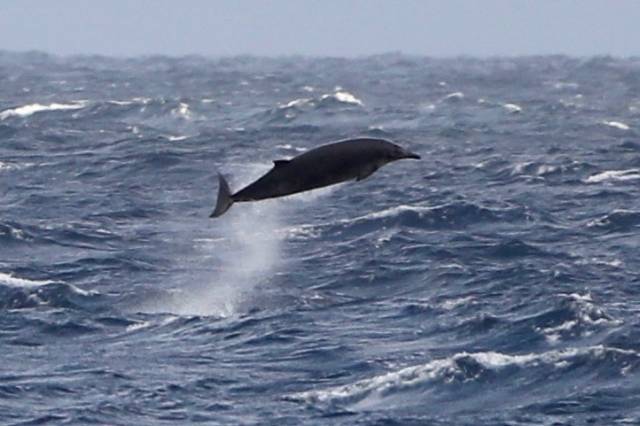#MarineWildlife - A team of scientists on board the RV Celtic Voyager got more than they bargained for during a recent survey to understand the habitat use of elusive beaked whales.
That’s when they encountered four separate groups of breaching whales within a couple of hours near the Rockall Trough.
Very little is known about beaked whales as they are rarely encountered at sea and are shy around vessels. New species of the elusive marine mammals are being described as recently as last year.
In Ireland there are at least four species of beaked whales: Sowerby’s, True’s, Cuvier’s beaked whale and the northern bottlenose whale.
“We think that the groups encountered were either Sowerby’s or True’s beaked whale, possibly both, they are incredibly difficult to positively identify at sea,” said Dr Patricia Breen of NUI Galway, chief scientist on the survey.
“We know that they undertake huge dives to great depths of up to 2500m for an hour at a time. They feed mostly on squid but also deep sea fish.”
The recent survey was a collaborative study between NUI Galway, UCC, the Marine Institute, Centre for Marine and Renewable Energy, Marine Conservation Research and Washington State University.
The aim was to characterise beaked whale habitat using acoustic technology in a small study area, as the whales are more likely to be heard rather than seen.
As well as using a hydrophone to detect whale clicks the team also characterised the habitat by recording oceanographic information such as salinity, temperature and depth, as well as the fish and squid species in the area, their most likely food source.
Dr Ailbhe Kavanagh of UCC said: “We had seen a group of breaching beaked whales the previous day and upon finishing up our acoustic transects decided to return to the area we had sighted them in previously.
“While steaming through this area we encountered four groups of beaked whales, all breaching, and all groups of between two to four individuals.” Dr Breen added: “The amazing thing about this encounter was the high number of sightings in such a small and specific area. Less than 30km separated the first and last sightings.
“This highlights an area that, whilst small, is potentially of huge importance to beaked whales in Irish waters. We hope to investigate this area further in the future.” During the survey, the team caught many species of fish which live in the mesopelagic zone between 200m and 1000m deep.
“Recent studies have shown that some beaked whale species prey on both squid and mesopelagic fish,” said UCC’s Prof Emer Rogan. “It is likely that the fish species we were catching in our nets is the reason the whales are here, to feed.
“The information collected on this survey will we helpful in our efforts to learn more about the species and to ensure adequate protection of the habitat of beaked whales in Irish waters.”
The survey, which took place from Sunday 29 October to Monday 6 November, was funded through the national research vessels’ ship time programme. This research survey was carried out with the support of the Marine Institute, funded under the Marine Research Programme 2014-2020 by the Irish Government.
The Marine Institute’s ship time programme provides annual grant-aid to researchers to access ship-time to facilitate research projects/programmes and further develop the national potential to carry out world-class multidisciplinary marine research. For further information contact Dr Patricia Breen at [email protected].
The survey team included:
- Dr Patricia Breen, chief scientist, School of Geography, NUI Galway
- Professor Emer Rogan, School of Biological, Earth and Environmental Sciences, UCC
- Dr Enrico Pirotta, School of Mathematics, Washington State University
- Dr Oliver Boisseau, Marine Conservation Research
- Dr Ailbhe Kavanagh, Centre for Marine and Renewable Energy/ERI, UCC
- Ashley Bennison, School of Biological, Earth and Environmental Sciences, and Centre for Marine and Renewable Energy/ERI, UCC
- Morag Taite, School of Natural Sciences, NUI Galway































































